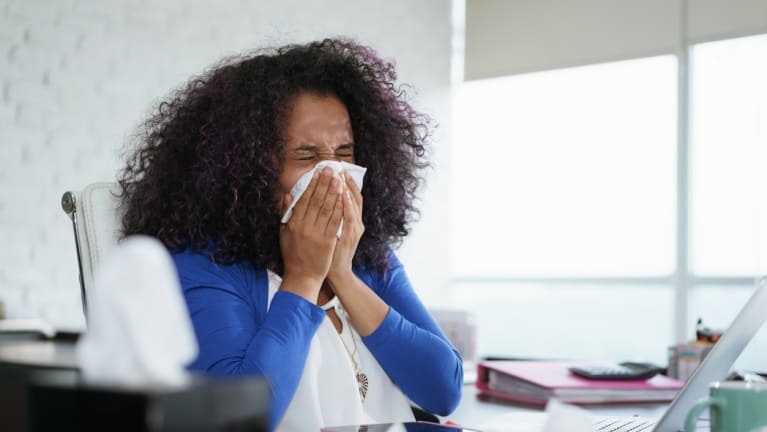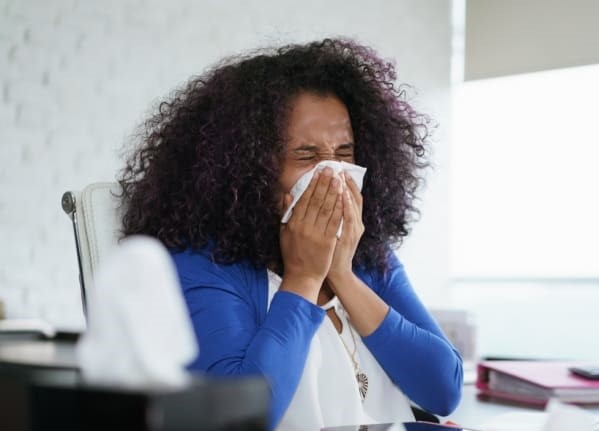Here are some helpful tips and reminders from a registered nurse to help keep you and your office healthy this flu season.

The 2019-2020 flu season is upon us and that means headaches, coughs, aches and runny noses are making the rounds in offices across the country. With the new strains of flu and a coronavirus outbreak surrounding us, here’s what employers can do to keep their workplaces running healthy this year.
Encourage Employees to Get the Flu Shot
Companies should consider hosting flu vaccine clinics by contacting their local public health departments or community clinics. The flu shot can keep individuals from getting sick, reduce the risk of hospitalization in children and older adults, and is important as added protection for individuals who suffer from chronic illnesses. Promoting the flu vaccine at work is a great way to prevent the illness from becoming part of the work environment and from parents bring the virus home.
If hosting a flu vaccine clinic is not an option, providing employees with prevention and treatment resources is essential. Help workers identify places where they can obtain a flu vaccine.
Review Sick Leave Policies
Remind employees to stay home and use their sick leave benefits without concern for reprisal. Encourage employee wellness and support the importance of their returning to work only when they are well. If necessary, adjust timelines for projects.
Since not everyone will have a fever, employees that suspect they are sick should stay home. Remember, the whole office could be vulnerable which has a far greater impact on productivity. Time away from work should be at least 4-5 days after the onset of symptoms. The sick person is most contagious for the first three days of the illness.
Exercise
Encourage healthy habits in the workplace. Regular exercise promotes good circulation, which helps prevent cells containing viruses and bacteria from traveling through your body. Employees should engage in physical activities and take a walk outside when weather permits. The fresh air and sunshine provide benefits that boost the effectiveness of cells that fight infection and potentiate the effectiveness of a flu shot.
Send Sick Employees Home
Employees who arrive at work and appear to have flu or coronavirus symptoms should be separated from others and asked to go home. If flexible work schedules are possible or telecommuting is possible that is a viable option for employees who must work but, must also be separated from others.
Nutrition
Encourage healthy options and promote healthy food handling in the workplace.
A well-balanced diet rich in protein, complex carbohydrates and diverse nutrients of vitamins and minerals will support a strong immune system in both adults and children. It’s important to serve whole foods to gain all the nutrients. For example, eat apples and oranges, rather than juices. Be sure to include fresh vegetables including broccoli, leafy greens, and white and sweet potatoes which are great sources of Vitamin C. Vegetables like raw cucumber, carrots, jicama provide added hydration with the Vitamin C and minerals.
Schedule relaxation and quiet time daily
Don’t ignore stress in the workplace. If you see your employees stressed and overloaded, see if you can help. Several studies have confirmed that stress in both adults and children can decrease white blood cells (lymphocytes) that are necessary to fight off the flu. A great way to combine exercise and relaxation while getting some added Vitamin D is to do basic yoga stretching and breathing. See if your workplace can either offer or provide discounts for yoga, massage or mediation.
Maintain a good bedtime time and routine
Encourage employees to get enough sleep. Not only does a good night’s sleep help employees think more clearly and be more productive, it keeps them healthy. Research has proven that fewer than 7-8 hours of sleep for adults and fewer than 8-9 hours of sleep for children weakens and damages the immune system by limiting the body’s ability to manufacture and circulate immune cells.
Sanitize
Once the illness has run its course and employees are returning to the office, it is important to continue taking preventive measures to reduce transmission of germs and re-infection.
Soap and water as well as alcohol-based hand sanitizer will keep hands clean but, it is also important to disinfect hard surfaces were the virus can linger for days. In addition to washing hands regularly, be sure that and that door handles, handrails, telephones desks, and computers are cleaned with an alcohol or bleach-based solution.
Be intentional in your personal interactions. Limit handshaking and wash hands frequently between person to person contact.
The best tips for preventing the flu and coronavirus are based on practical advice and common-sense strategies. Employers can make a difference in their employees’ ability to avoid the flu and coronavirus or minimize its impact. Doing so will keep productivity moving and in turn also protect their families.



This article made a great point when it explained that it is important to keep handrails in an office space sanitized so that the coronavirus cannot spread. It makes sense to keep handrails clean because they are probably one of the most touched objects in a location especially if they accompany stairs. Keeping a large supply of sanitizers on hand seems like the best way to keep an office space clean.